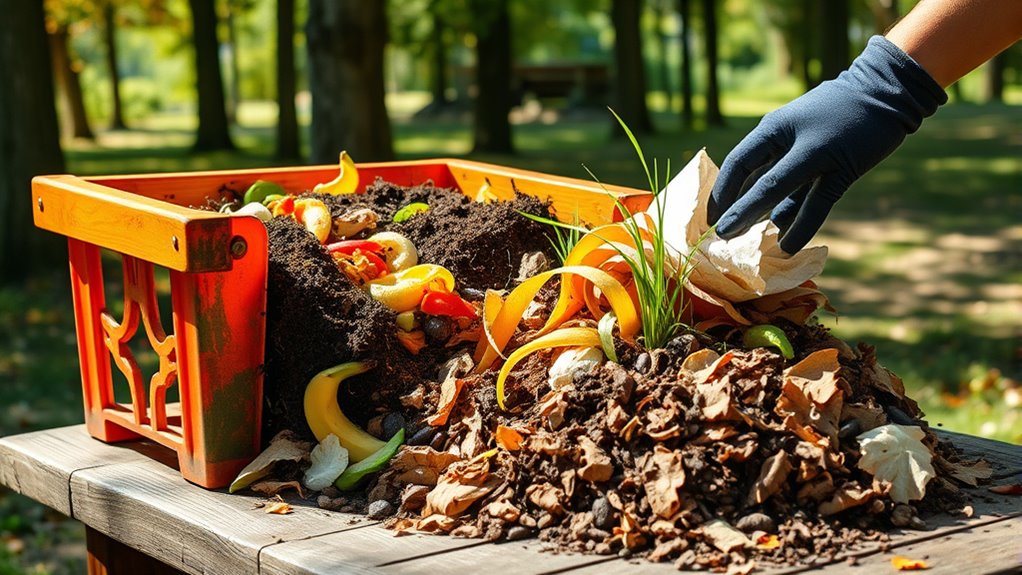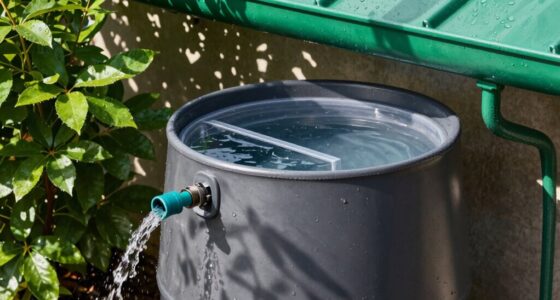Composting turns your kitchen scraps like fruit peels, coffee grounds, and eggshells into rich soil that benefits your garden. Choose a method that fits your space and budget, such as worm composting or tumblers. Keep your pile balanced with greens and browns, maintain moisture, and turn it regularly for faster results. Using your finished compost improves soil health and plant growth. Keep exploring, and you’ll discover all the tips to make composting simple and successful.
Key Takeaways
- Collect kitchen scraps like fruit peels, coffee grounds, and eggshells to start your compost pile.
- Balance greens (nitrogen-rich) and browns (carbon-rich) for efficient decomposition.
- Maintain moisture levels similar to a damp sponge and turn the pile regularly for aeration.
- Avoid composting meat, dairy, oily foods, and pet waste to prevent pests and odors.
- Use finished compost to enrich garden soil, improve plant health, and retain moisture.

EPICA Countertop Compost Bin Kitchen | 1.3 Gallon | Odorless Composting Bin with Carbon Filters | Indoor Compost Bin with Lid | Stainless Steel Kitchen Composter for Food Scraps & Waste Recycling
FEATURED IN BON APPETIT & FORBES: Recognized by renowned magazines, EPICA’s compost bin is a perfectly sized marvel…
As an affiliate, we earn on qualifying purchases.
As an affiliate, we earn on qualifying purchases.
Understanding the Basics of Composting
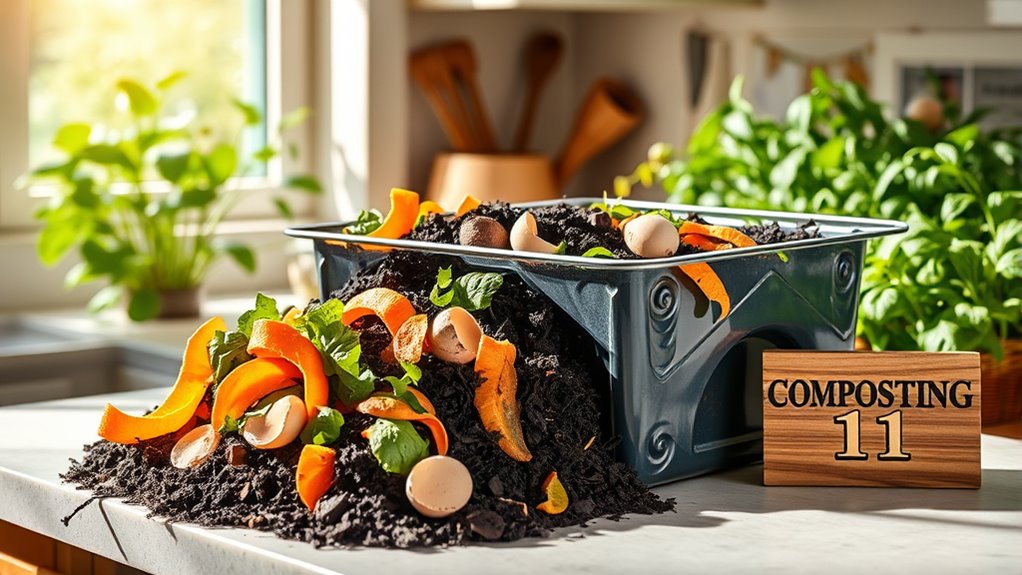
Understanding the basics of composting is essential if you want to turn kitchen scraps and yard waste into nutrient-rich soil. One of the first steps is choosing the right types of compost bins, which include tumblers, tumbling bins, and traditional piles. Each type offers different benefits, so pick what suits your space and lifestyle. Many people believe composting is complicated or attracts pests—that’s a common composting myth. In reality, proper management and choosing the right bin can make composting simple and clean. You’ll want to balance greens and browns, keep the bin moist, and turn it regularly. By understanding these essentials, you set yourself up for successful composting and healthier garden soil. Additionally, understanding the side effects of juice detox can help guide your approach to healthier living and sustainable waste practices.

The Original VermiHut® Plus 5-Tray Worm Composter – Dark Green | Indoor & Outdoor Vermicomposting Bin | Sustainable Design for Food Waste Recycling
Compact, High-Efficiency Footprint Designed to maximize composting capacity while minimizing floor space.
As an affiliate, we earn on qualifying purchases.
As an affiliate, we earn on qualifying purchases.
Choosing the Right Composting Method
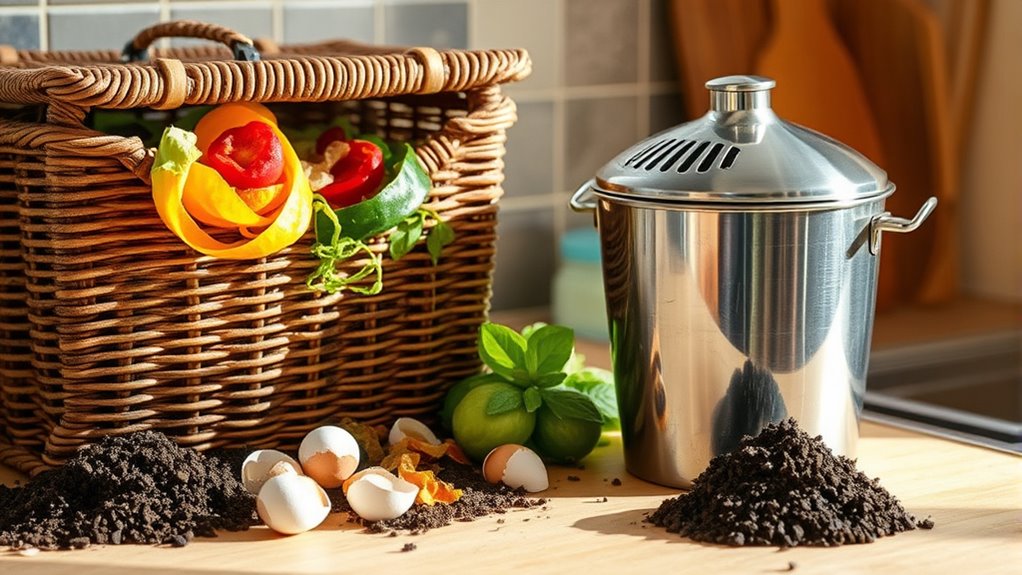
Choosing the right composting method depends on your space, budget, and lifestyle. If you have limited space, worm composting is ideal; it’s compact and odor-free. Trench composting works well if you prefer a hands-off approach and have a garden bed. Consider your budget: worm bins require an initial investment, while trench composting is inexpensive. Your lifestyle also matters—if you want quick results, compost tumblers are faster, but they cost more. Here’s a quick comparison:
| Method | Space Needed | Ease of Use | Cost |
|---|---|---|---|
| Worm composting | Small, indoor or outdoor | Easy, low maintenance | Moderate |
| Trench composting | Large outdoor garden | Low, seasonal work | Low |
| Compost tumbler | Small to medium outdoor | Easy, fast | Higher |
| Bin composting | Moderate outdoor space | Moderate | Moderate |
| Vermicomposting | Indoor, small space | Easy, odor-free | Moderate |

VIVOSUN Outdoor Tumbling Composter Dual Rotating Batch Compost Bin, 43 Gallon Black Door
Twin chambers: Two separate chambers allow one side to finish composting while leaving the other side available to…
As an affiliate, we earn on qualifying purchases.
As an affiliate, we earn on qualifying purchases.
What to Compost and What to Avoid
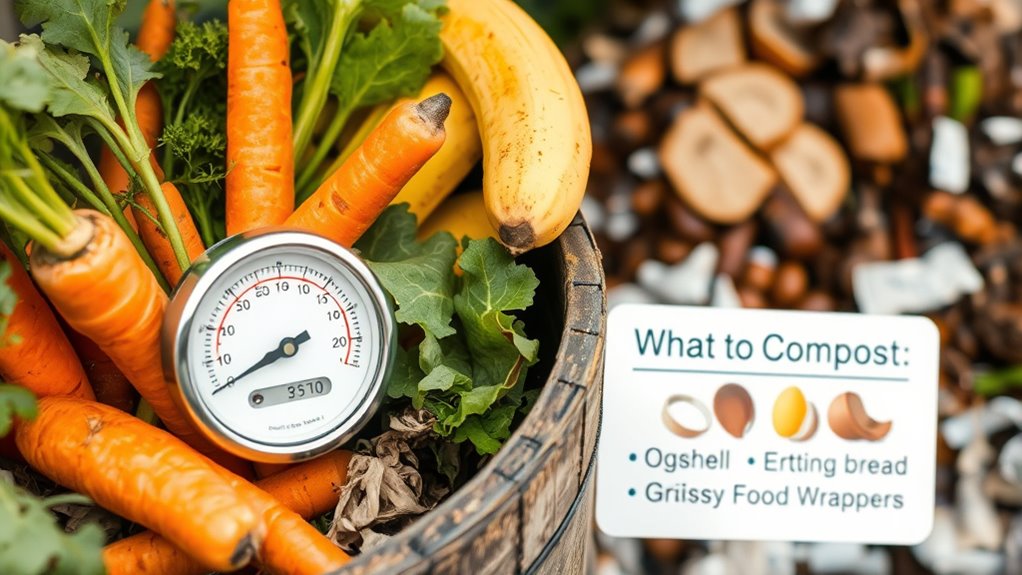
Knowing what to compost and what to avoid is key to maintaining a healthy, efficient compost pile. Types to include are fruit and vegetable scraps, coffee grounds, eggshells, grass clippings, and leaves. These materials add nutrients and help balance your compost. Items to exclude include meat, dairy, oily foods, and pet waste, as they can attract pests and cause odors. Avoid composting diseased plants or invasive weeds, as they could spread unwanted organisms. Additionally, steer clear of charcoal ashes, synthetic chemicals, and plastics, which can contaminate your compost. Properly selecting what to compost and what to avoid keeps your composting process smooth and effective. Incorporating soil health principles can further enhance the nutrient value of your compost and promote sustainable gardening practices.

EPICA Countertop Compost Bin Kitchen | 1.3 Gallon | Odorless Composting Bin with Carbon Filters | Indoor Compost Bin with Lid | Stainless Steel Kitchen Composter for Food Scraps & Waste Recycling
FEATURED IN BON APPETIT & FORBES: Recognized by renowned magazines, EPICA’s compost bin is a perfectly sized marvel…
As an affiliate, we earn on qualifying purchases.
As an affiliate, we earn on qualifying purchases.
How to Build and Maintain Your Compost Pile
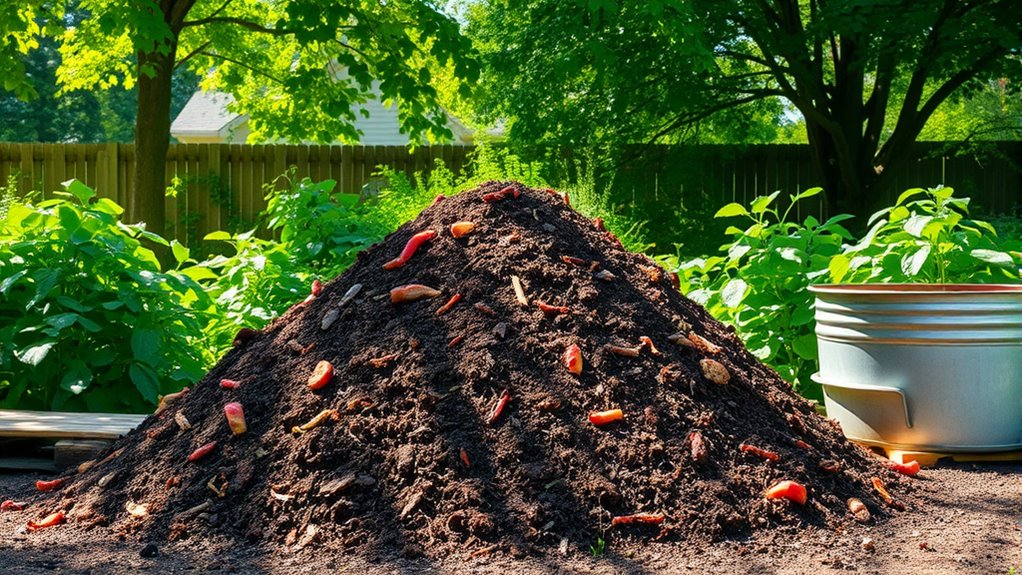
Building your compost pile is straightforward when you select a suitable spot, ideally on bare soil or a compost bin, to allow beneficial organisms to thrive. Your compost bin design should include good airflow and easy access for turning. Use a mix of greens and browns to maintain balance, and layer materials to promote decomposition. Moisture management is vital; keep the pile damp but not soggy, similar to a wrung-out sponge. If it gets too dry, add water or moist materials. If it’s too wet, add dry browns like leaves or straw to absorb excess moisture. Regular turning aerates the pile, speeds up composting, and helps distribute moisture evenly. Incorporating vertical storage solutions can optimize space and improve airflow within your compost area. With proper design and moisture control, your compost pile will break down efficiently into rich soil.
Using Your Finished Compost to Benefit Your Garden
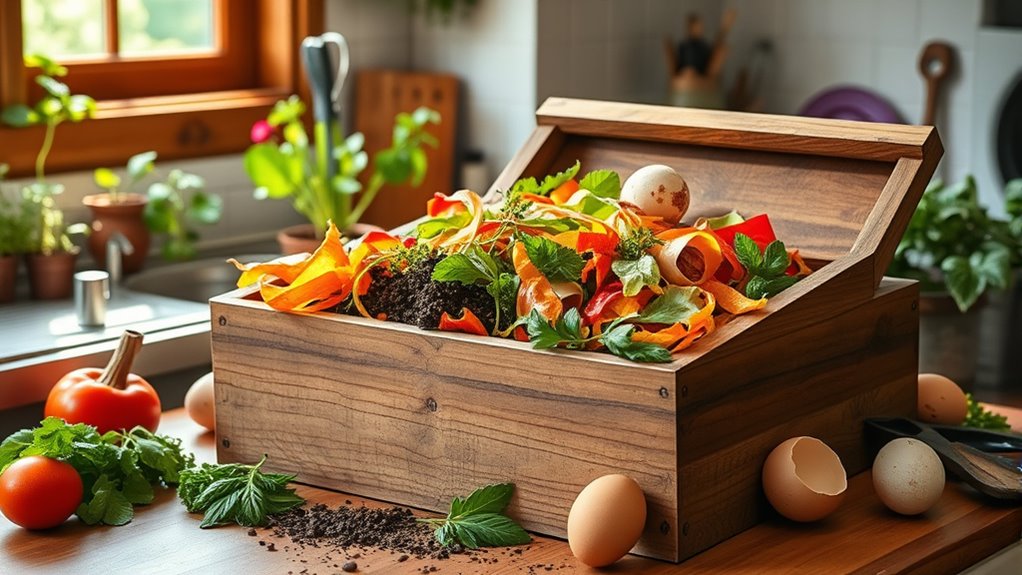
Once your compost has fully broken down into dark, crumbly soil, you can start using it to boost your garden’s health. Incorporate your finished compost to enhance soil enrichment and encourage plant growth. Here are three ways to maximize its benefits:
- Spread a thin layer of compost around plants to improve soil nutrients and structure.
- Mix compost into your garden beds to foster healthy root development.
- Use compost as a top dressing to retain moisture and suppress weeds.
- To ensure optimal results, consider continuous evaluation of your compost’s quality and nutrient content.
Frequently Asked Questions
How Long Does It Typically Take for Compost to Be Ready?
You might wonder how long it takes for compost to be ready. Typically, the compost timeline ranges from 3 months to a year, depending on factors like ingredients, moisture, and aeration. You’ll know compost reaches maturity when it looks dark, crumbly, and earthy. Keep turning it regularly, and you’ll see the compost maturity process accelerate, giving you rich soil for your garden in due time.
Can I Compost Meat or Dairy Products Safely?
Picture your compost pile as a thriving garden city. When it comes to meat composting and dairy composting, you’re inviting trouble if you don’t follow strict rules. These items can attract pests and cause odors, ruining your city. If you’re serious about composting meat and dairy, use a hot compost system designed for it, or consider vermicomposting with special worms. Otherwise, avoid adding meat and dairy to keep your compost safe and odor-free.
What Are Common Signs of a Compost Pile That’S Not Functioning Properly?
When your compost pile isn’t working properly, you’ll notice common signs like foul odors and pest attraction. These issues often indicate your compost isn’t breaking down correctly, possibly due to too much moisture, imbalance of greens and browns, or poor aeration. To fix this, turn your pile regularly, add dry materials, and monitor moisture levels. Keeping your compost balanced prevents pests and foul smells, ensuring healthy, nutrient-rich soil.
How Do Temperature Fluctuations Affect Composting?
Think of your compost pile as a thriving garden, needing steady care. Temperature fluctuations can shake its foundation, disrupting microbial activity and causing the process to stall. When temperatures swing wildly, microbes struggle to do their job, slowing decomposition. To keep compost healthy, aim for temperature stability, ensuring microbes stay active and your compost turns into rich soil faster. Consistent warmth is the key to a lively, productive compost.
Are There Any Legal Restrictions on Composting in Urban Areas?
You might wonder if urban regulations or composting permits limit your composting efforts. Generally, many cities encourage composting, but some have restrictions to prevent pests or odors. Check local ordinances, as you may need a permit or follow specific guidelines. Staying compliant guarantees you avoid fines and contribute positively to your community. Always research your city’s regulations to enjoy eco-friendly composting without legal concerns.
Conclusion
Now that you know how to turn kitchen scraps into rich soil, you’re ready to transform waste into a garden treasure. It’s simple to create nourishing compost, yet easy to overlook the small details that make it thrive. By understanding the basics and staying consistent, you’ll see your garden flourish. Composting isn’t just about recycling; it’s about nurturing life—turning everyday scraps into vibrant, healthy soil that feeds your plants and sustains your passion for gardening.
